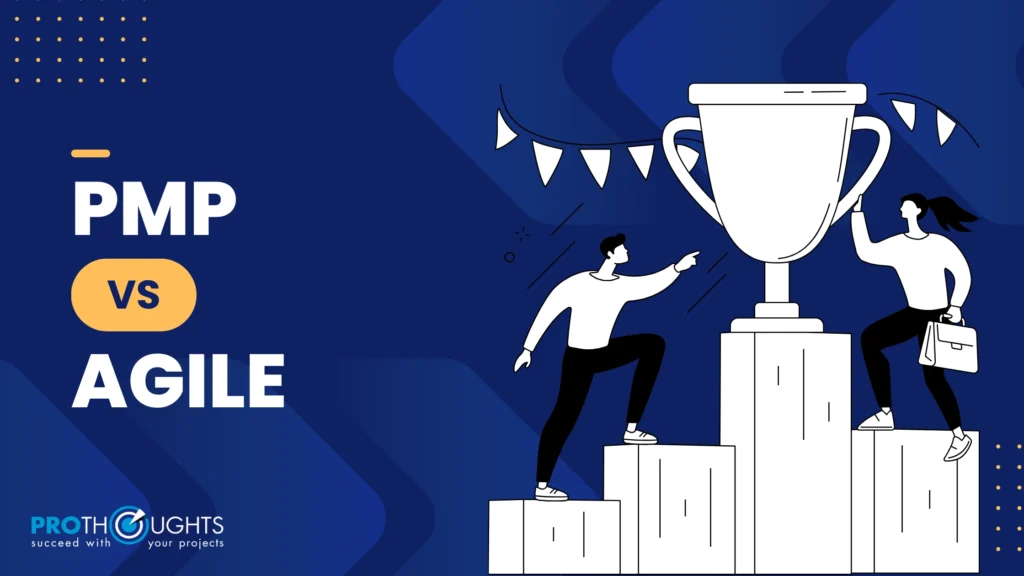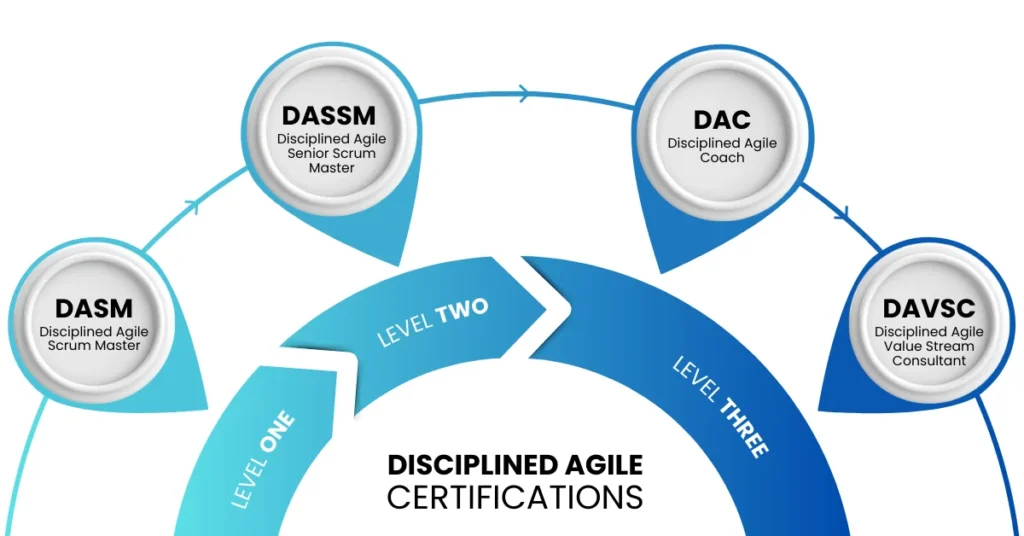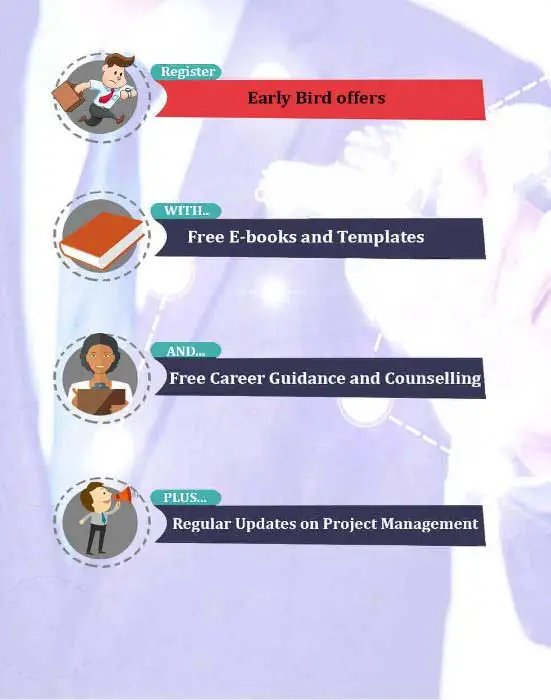
Quite recently, Project Management Institute (PMI) introduced Agile concepts to its most popular offering – the PMP certification. PMP has the most widely accepted curriculum with respect to project management. Until 2021, it only prescribed predictive methods (like the waterfall model) for project management. However, the latest PMP exam pattern contains Agile as well as hybrid project management approaches. Although this is a revolutionary step, it has stirred some confusion. This is because PMI also launched Disciplined Agile recently. Therefore, the elephant in the room is the question – If PMP also includes Agile, do I need to undergo Disciplined Agile training too? As PMI’s Premier ATP, we have the answer for you in this blog! Let’s understand PMP vs Agile, more specifically, PMP certification vs Disciplined Agile certification.
PMP vs Agile: What Sparked The Debate?
PMP vs Agile has been a long-standing debate because these two terminologies represent two very different approaches to project management. Until a few years back, PMP solely consisted of traditional predictive project management methodologies, like the waterfall model. Agile, on the other hand, uses a more flexible approach to project management. Agile consists of several methodologies such as Scrum, Kanban, XP, etc.
But, PMP also included Agile in its curriculum in 2021. With PMP also turning into Agile mode, many are confused about whether you need any specialized training in Agile. It seems PMP is an all-encompassing solution. Moreover, PMP carries a legacy of success too with millions of PMP-certified practitioners across the globe. But then what is Disciplined Agile? Doesn’t it talk about Agile in particular?
Many new aspirants to project management and PMI courses, in general, are unsure which one to go for first. Are they similar or distinctly different? Or are they complementary, coming from the same institute? The existence of the popular PMI-ACP certification also stirs more confusion.
There was no literature on the PMP vs DA aspect when we started writing about it. This article aims to give insight into the similarities and differences between PMP and Disciplined Agile, arguably the 2 best offerings from PMI. One (PMP – Project Management Professional), which has stood the test of time and undergone many changes right from the 1990s to 2021; And the new novel Toolkit, Disciplined Agile, which offers Business Agility for teams and enterprises to transform their Way of Working (WoW).
Let’s explore these 2 significant certifications in more detail.
What Is PMP Certification?
Project Management Professional (PMP) certification is a well-known certification for project managers. It is offered by the Project Management Institute (PMI). The PMP is one of the best offerings from PMI to date and it has stood the test of time. It was introduced in 1984 and since then it has undergone significant transformations.
Earlier, the PMP focused on traditional project management approaches only. As of 2024, the PMP syllabus is divided into three domains: People, Process, and Business Environment. 50% of the syllabus focuses on predictive project management approaches. The rest focuses on Agile and hybrid project management approaches.
The PMP is a classic combination of the Project Management Standard and the Project Management Body of Knowledge (PMBOK) Guide. The Standard of Project Management contains the non-prescriptive things, which are the erstwhile Process Groups. Prescriptive things are the dos and don’ts, an analogy similar to the doctor who gives you prescriptions to cure your illness. The Standards are non-prescriptive though (exactly opposite to prescriptive) and can be applied across all the projects. The PMBOK Guide is your practices – The performance domains and project management standards from the current 7th edition that are applicable to your projects.
The entire unison of the Standard and Guide gives you the Project Output.
What Are The Changes In The New PMP Syllabus?
The PMBOK in any new avatar undergoes research conducted by PMI to incorporate the current and future benchmarks, the external environments, and many more things to develop a robust standard. PMI conducted an extensive effort and study over the years to produce a certification admired by industry and apex bodies throughout the world. PMI’s Project Management Body of Knowledge, PMBOK Guide’s 7th Edition was introduced in August 2021. PMBOK introduced a completely different approach to PMP in the latest edition.
Read the difference between PMBOK 6 vs PMBOK 7 in our latest blog.
The earlier PMBOK versions focused on knowledge areas. However, the new PMBOK 7th edition has replaced the traditional knowledge areas with performance domains. The 8 performance domains showcase the elements essential to a project’s success:
- Team.
- Stakeholders.
- Life cycle.
- Planning.
- Uncertainty and ambiguity.
- Delivery.
- Performance.
- Project work.
That’s not it. In place of the PMP domains, the PMBOK 7th Edition introduced 12 new project management standards or principles:
- Stewardship.
- Team.
- Stakeholders.
- Value.
- Holistic Thinking.
- Leadership.
- Tailoring.
- Quality.
- Complexity.
- Opportunities & Threats.
- Adaptability & Resilience.
- Change Management.
As you can see above, PMP is not changing but evolving. It is still a “Framework” and still incorporates Process Groups and Knowledge Areas, but in a different way. It is a myth that PMP is turning into Agile or Agility practices but giving guidance on the entire delivery cycle including Agility. The new PMP will give specific guidance on tailoring your projects and introducing different working models. Agile was a part of PMBOK 5th edition as well and the Hybrid model was also present in the same edition. However, it is now more focused.
What Is Agile?
To begin, Agile is a collection of methodologies. There are several agile practices right now – such as Scrum, Kanban, SAFe, etc. To demonstrate expertise in specific practices, there are agile certifications with a laser focus on them. For example, there is the Certified Scrum Master certification that focuses on Scrum, Kanban Management Professional (KMP) certification for Kanban methodology, and SAFe POPM for the SAFe methodology in Agile.
Now, PMP also includes a section dedicated to Agile. So do you need Agile training? Moreover, should you just go on collecting certifications in different Agile methodologies to have a comprehensive knowledge base? That’s just not ideal, is it? Enter Disciplined Agile! The one umbrella that covers it all with its lucid roadmap of courses! You gain 100% knowledge of hundreds of agile methodologies in each step. But, as you further level up, you are better equipped to lead bigger teams and even organizations as a whole!
What is Disciplined Agile?
Disciplined Agile, in its core sense, is a toolkit. This Disciplined Agile toolkit consists of hundreds of Agile practices. It includes Kanban, DevOps, Extreme Programming (XP), Waterfall, Lean project management, and many more. But, it is not limited to Agile either. It also includes the PMP approach to project management! You can choose the ideal features out of each practice to create a workflow that suits you best. Disciplined Agile methodology gives you the freedom from getting stuck with a single methodology or framework. Moreover, it prioritizes people over processes, as in, it keeps you and your working patterns into consideration before prescribing “best practices”. DA allows you to tailor practices, pick the best traits of each one, and create an optimal way of working for you and your agile team!
Disciplined Agile can be applied to your entire organization to bring Agility at scale. Agile scaling helps businesses become adaptable to any hitches so you stay at the top of the curve. Agile Frameworks that help implement agile at scale already exist – such as SAFe and Spotify. What makes Disciplined Agile the most ideal is that it starts where you are. So, businesses and teams can adapt their current processes with the help of Disciplined Agile. It is probably the best aspect of DA since you won’t have an overhead while transitioning to it! Moreover, DA has SAFe and Spotify approaches as its subsets. So, you have the best of all under one Disciplined Agile umbrella!
Disciplined Agile offers a certification journey from Level 1 – Disciplined Agile Scrum Master (DASM) to Level 2 – Disciplined Agile Senior Scrum Master (DASSM) to Level 3 – Disciplined Agile Coach (DAC) and Disciplined Agile Value Stream Consultant (DAVSC).
PMP vs Agile With PMI’s Disciplined Agile
PMP and Disciplined Agile are arguably the best and most relevant certifications from PMI currently. PMI does extensive research on the gaps in the current, near, and far future to develop standards and certifications to fill in those gaps. PMBOK 7th edition was planned many years in advance and Disciplined Agile came as a result of a pre-planned strategy in 2019 to give organizations Agility. Let’s understand PMP vs Agile further, with this well-thought-out move by PMI to introduce PMBOK 7 and DA.
-
The Fundamental Difference: What is it?
PMP is a Framework, while Disciplined Agile is a Toolkit. As per the Cambridge Dictionary, a Framework is a system of rules, ideas, or beliefs that is used to plan or decide something. Alternatively, it is a Supporting Structure around which something is built. Thus, PMP certification gives you the supporting structure to build your own practice. It gives you beliefs and rules to tailor the way you manage your projects.
On the contrary, Disciplined Agile is a Toolkit. Therefore, it gives you multiple tools or options, depending on your current context and situation. Disciplined leverages Agile, Lean, and a multitude of Agile practices to help you and your teams improve your way of working. Moreover, it includes the PMP and concepts in the PMBOK as well. So, as an answer to the PMP vs Agile debate, choose Disciplined Agile if your priority is Agility (with effective project management measures on the side.)
-
Goal: What Is Its Purpose?
PMP is designed for project managers to manage their projects and achieve ideal outputs. The new edition talks about Project Outcomes, which is very confusing and should be used with regard to Benefits and Program Management. On the contrary, Projects are concerned with Project Output, which focuses on Deliverables and delivering capability. So, the term “Project Output” seems more suitable.
Disciplined Agile is designed for teams and organizations to achieve Business Agility. Business Agility is when the entire business pivots to produce value for the customer and is not constrained to a single team. Unless all the functions and teams are agile, the business cannot be agile. Thus, by crafting an ideal way of working, in a step-by-step manner, DA helps attain true enterprise agility. It starts with a team adopting Disciplined Agile, and slowly, the organization inculcates an improved way of Working.
-
Positioning: Where Can You Apply It?
I would say that PMP’s positioning is generic – applicable to all projects across the domains and geography. This is due to its roots in the Project Management Standard, which is non-prescriptive and applicable to all projects.
On the other hand, Disciplined Agile provides depth and novelty in the Agile world. It is specialized in Agile, and we believe that it complements PMP well. A practitioner who wants to explore Agility and become a specialist can deep dive into Disciplined Agile. In the same vein, if they want to typically manage their project PMP can be the panacea.
However, for DA, the mindset plays an important role. There have been numerous instances where many teams and organizations have adopted Agile ceremonies but still manage the projects in Waterfall mode. The mindset doesn’t fully transform into Agile. For Disciplined Agile, the mindset is a foundation “View” or a foundation block. The mindset has to be Agile, and it has to be based on the set principles and guidelines of DA. Only then does the application of Disciplined Agile become feasible.
-
Ingredients: What Does It Include?
Both these certifications – PMP and Disciplined Agile – are knowledge-intensive. So, with able guidance, participants feel delighted at the end of their learning sessions. Reviews from our batches might help you to get an idea. The content for PMP and Disciplined Agile is superior. There is a lot to learn, unlearn, and more importantly, apply in real-life situations.
For example, PMP is going to focus on various methods and models, which at the core are Process Groups (erstwhile) and Performance Domains (the Knowledge Areas), and give tailoring guidelines for your project. Further, different models, including foundational knowledge of Agile and Hybrid project management models, are a part of the guidance.
Disciplined Agile provides a lot of breadth and is an incredible combination of Lean, Agile, Scrum, and more. It covers a lot of important stuff from varied Agile practices and has strategies and guidance not only for your IT project team but for all functions in the organization. Therefore, you can deliver high value in the most optimum way.
-
Takeaways: What Do You Learn From It?
The takeaway and the focus of getting a PMP certification is to know how to deliver your projects within your constraints and meet your customers’ expectations.
The takeaway of Disciplined Agile is to set on a journey of Agile Adoption and Transformation for your team and organization to produce value in the most efficient and effective way possible.
-
Target Audience: Who Is It For?
The PMP certification is for Project leaders, practitioners, and experts across industry verticals and geographies.
The Disciplined Agile certifications are for a broader universe – it is for everyone involved in delivering value to the customer. Usually “frameworks” are applicable to project teams and value delivery units. But DA extends beyond that to apply Agility to all segments of an organization. Be it project teams, Operations, Support, Marketing, Sales, Procurement, Legal, Finance, etc., whoever contributes to delivering value to the customer – Disciplined Agile is for them!
-
Value in the market: Is It Worth It?
The PMP Certification helps you earn credibility in the eyes of employers across industries and geographies. It is one of the apex certifications and a standard to manage your projects. In fact, in some organizations, it is a must-have credential to manage a project. The PMP certification often acts as a catalyst to obtain a job and boost your career.
Disciplined Agile is a new and novel proposition among the multitude of Agile knowledge and certifications. The fact that PMI is promoting it gives it enough credibility to gain acceptance among top industry players. It does have great content, and many top leaders and organizations have started adopting Disciplined Agile. As of 2024, giants like Franklin Templeton and Barclays have adopted DA and achieved astounding results. We are sure that the value of Disciplined Agile is going to surge, and demand is going to increase in the near future too.
Also Read:
Is PMP Certification Worth It?
Is DASSM Certification Worth It?
-
Cost: How Is It Priced?
The PMP certification fee is $405 – $425 for PMI members and $575 – $595 for non-members. This was the PMP exam fee, to attain the membership PMP aspirants must pay a fee of $139-$159. The cost difference is based on geography – segregated as the USA and the rest of the world. The PMI membership cost is optional, but it does help you save a lot of money later on. In addition to the fee paid to PMI, there are also training costs involved. PMP eligibility criteria include 35 Hours of PMP training from PMI’s ATP. Adding the exam fee, the total PMP certification cost could come to around $700 – $3000. ProThoughts is considered a premium provider in the Indian market due to its superior content, methodology, delivery, and support.
The cost for the Disciplined Agile certification exam is included in the training fee you pay to PMI’s training partners. It can come to around $1500 – $3000.
You can check out the best offers on PMP and DA certification courses on our website!
Closing Thoughts On PMP vs Agile:
PMP and Disciplined Agile are among the most trending certifications from PMI. PMI strives to fill in any gaps in their offerings and hence continually updates and upgrades them. PMP certification has always been a winner for PMI, and it has been seeing upgrades here and there over the years.
PMI’s Disciplined Agile is new and still making its mark in the global project management community. PMI introduced it with the purpose of making entire enterprises run on Agile principles. Disciplined Agile has a refreshing approach to bringing Enterprise Agility to an organization. So far, it is leaning toward being a winner too!
Both these certifications have their set purposes and stand distinctly different in terms of their course content, approach, and outcomes. We feel both are integrated offerings and complement each other pretty well.
ProThoughts is proud to be one of the 1st Premier partners for Disciplined Agile in the entire globe. ProThoughts has been very active in coming out with new content and articles on Disciplined Agile and collaborates strongly with PMI to evangelize Disciplined Agile. We have our expert – Ashish Sadekar, at the forefront of the Disciplined Agile movement. He is one of the first to attain the Level 3 certifications – Disciplined Agile Coach as well as Disciplined Agile Value Stream Consultant. Moreover, he is one of the handful across the globe with instructor status for all DA courses by PMI!
We have a decade-long legacy with PMP training. With the promise Disciplined Agile shows – it looks like it is going to stick too!
Who wins the PMP vs Agile debate? In this rare case – it is a tie between PMP and Disciplined Agile!





